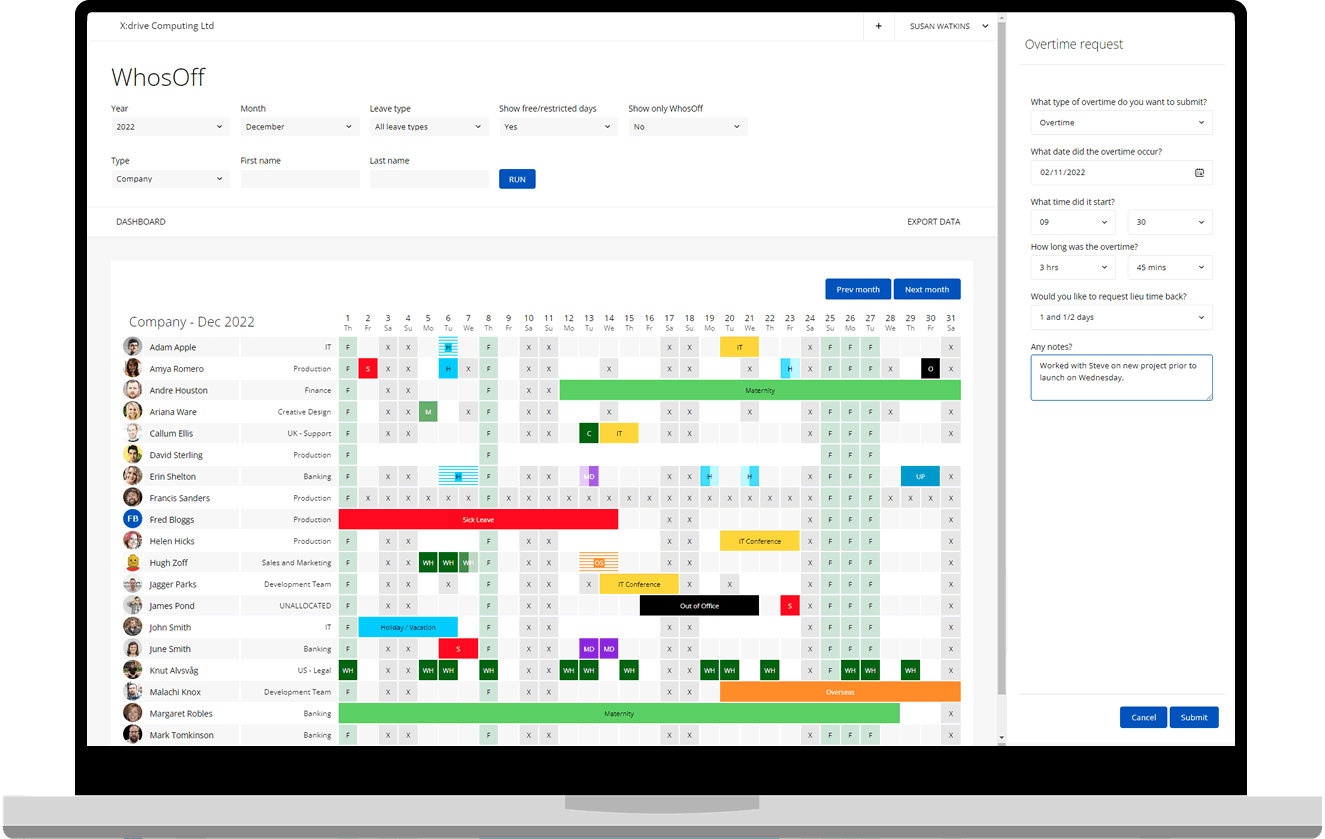Overtime Management Software
Often, staff go above and beyond what’s required of them to drive company success. You want to make sure that effort is rewarded – either through paid overtime or time off in lieu (TOIL). But how are you tracking those hours?

The most successful overtime schemes keep a close eye on who’s working, when. Too many extra shifts and your key personnel become tired and unproductive. Too few, and people may think you’re favouring other team members.
To allocate overtime fairly and avoid employee burnout, your business needs an efficient system in place. WhosOff is a digital leave management platform with built-in features for recording overtime and managing TOIL.
Get your Free trial of WhosOff, instantly!
Our software can
- Log every hour of overtime your team works in a central, online location – including on the move via the WhosOff mobile app
- Help you offer TOIL as an alternative to paid overtime, by logging extra shifts worked alongside paid holiday
- Run regular overtime reports to align staff hours with payroll and allocate additional opportunities fairly, based on who has completed the most/least overtime
- Allow team leaders and managers to check upcoming schedules and holiday bookings online, to identify staffing shortages ahead of time
- Check who is and isn’t using their TOIL to make sure everyone has taken their hours by the end of the holiday year
Running an overtime programme is a practical way to make sure staff absences don’t slow your company down. However, too much overtime will impact your bottom line.
WhosOff allows you to strike the right balance, while make sure additional shifts are reflected in staff wages or their time off allocation.
How? By recording every team member’s overtime hours online, so you can use this data to underpin business decision-making:
Overtime monitoring & reportingPull weekly, monthly, quarterly or annual reports to see which person or team is doing the most overtime in your business. This will help you to manage overtime better long-term, for example by ensuring that overtime opportunities are being evenly distributed between employees, or recruiting new resources within departments logging the most additional hours.
Creating overtime policiesThe data you extract and share around overtime management can also shape your company policies. For instance, you can set in writing the maximum number of additional hours each employee is allowed to work per week or month. For more information about creating overtime guidelines, visit our policies page.
Payroll integrationsFor companies that choose to pay staff for overtime rather than earning time off in lieu, a central overtime management system collects all the data your finance team needs to accurately run payroll.
Discover how easy it is to track and manage staff overtime online using the WhosOff platform. Sign up now to start your free trial.
Try WhosOff's overtime management tools today
Frequently Asked Questions
Can we limit allowed overtime?
Yes – whether through legal requirement or personal preference, your company can limit the amount of overtime each employee is allowed to undertake. The easiest way to coordinate this is through an online leave management system like WhosOff, which calculate how many hours each person has completed on your behalf. This way, you can make sure additional requirements are distributed evenly between team members.
Is overtime paid or unpaid?
Ultimately, it’s up to each company individually to decide how overtime should be compensated. Some businesses choose to pay employees for overtime, as it encourages more people to volunteer for additional work. But if you’re particularly busy, this can quickly become very expensive.
Often companies choose to make overtime unpaid but offer another incentive instead – such as time off in lieu. But if you pursue this route, make sure you record lieu time on your company holiday calendar, to make sure staff time off is managed appropriately.
For more information and support, read our blog: time off in lieu versus overtime – what’s the difference?
Can we produce reports on staff overtime?
Yes – in fact, it’s a good idea to regularly analyse and report on overtime, so everyone in your businesses realise how hard people are working.
Gaining a clear overview of additional hours worked helps you to make strategic decisions on resourcing and staffing, to stop employees burning out. And if you’re using an overtime management system like WhosOff, it’s very simple to extract information and create reports to share with senior colleagues.